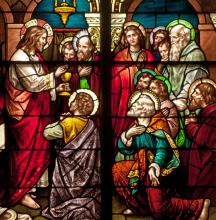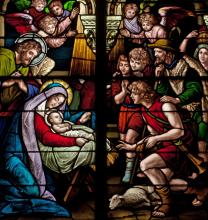Jesus

An independent report commissioned by the American Psychological Association (APA) has found that the association secretly colluded with the Department of Defense and the CIA to weaken the APA’s ethical guidelines and allow psychologists to take part in government torture programs under the Bush administration post-9/11.

"Would you give an addict a clean needle, so they could stay alive until they found freedom from their addiction? Would you give a prostituted woman condoms, so she could protect herself until she found freedom from prostitution?"
Clearly, the famous evangelical leader I was speaking with in Cambodia didn't think we should be helping people in this way. He was adamant that Jesus would never give out condoms or clean needles. He insisted that the little clinic we were running in a Phnom Penh brothel was a waste of time and inconsistent with the gospel.

I'm afraid Christians too often have overemphasized Jesus’ commandment, "Go and sin no more!" at the expense of his earlier phrase, "...Neither do I condemn you." Could it be that Jesus' admonition to "sin no more" is a jab directed instead at the religious leaders? That Jesus is telling them if they don't quit their sinning, the sin police will have them killed? And Jesus might not be there next time to save them?

WHEN YOU GIVE a luncheon, Jesus says, don’t invite your rich neighbors; instead invite the poor, the vulnerable, the outcast. I was reminded of Jesus’ words recently when President Obama came to Boston. Local foodies celebrated his stop at a hip restaurant. However, only the “rich neighbors” were invited: Thirty guests who had paid up to $33,400 each in political contributions were given the opportunity to lunch with the president.
Amazingly, a $33,000 lunch is pocket change for those now entitled, thanks to Citizens United, to the ears of our politicians. In the 2012 election, one multibillionaire spent $150 million to defeat Obama. Thirty-two super PAC donors, “giving an average of $9.9 million each, matched the $313 million that President Obama and Mitt Romney raised from all of their small donors combined—that’s at least 3.7 million people giving less than $200,” stated a 2013 report that examined Federal Elections Commission data.

During a broad conversation on how to overcome poverty at Georgetown University last week, President Barack Obama made a few comments about how Fox News talks about poor people. Here’s what he said:
“ … over the last 40 years, sadly, I think there’s been an effort to either make folks mad at folks at the top, or to be mad at folks at the bottom. And I think the effort to suggest that the poor are sponges, leeches, don’t want to work, are lazy, are undeserving, got traction. … I have to say that if you watch Fox News on a regular basis, it is a constant menu — they will find folks who make me mad … They’re like, I don’t want to work, I just want a free Obama phone — or whatever. And that becomes an entire narrative … very rarely do you hear an interview of a waitress — which is much more typical — who’s raising a couple of kids and is doing everything right but still can’t pay the bills.

Jesus not only knew how to pray; he knew what it was like to be arrested. When he had finished his table prayer, Jesus and his disciples went out across the Kidron valley to a garden. Judas knew about that garden because he and the other disciples often met there with Jesus. This time, Judas didn’t come to pray, but brought a detachment of soldiers and religious police. They arrested Jesus, bound him and took him away to be tried.
Jesus escaped prison only because he was executed by the state the next day. This crucified, risen, and wounded Jesus has returned to the heart of God. He continues to pray for us. Why wouldn’t Jesus be praying also for those who are in prison? Why wouldn’t we?

THE SEASON AFTER Pentecost is a challenge. Some churches call it “ordinary time.” This is where most of our life is lived, spiritually speaking. The fact that other churches call it “the season after Pentecost” reminds us that a miraculous tongue of fire is needed for any sermon to work—and the Holy Spirit has a tongue of fire for us. Pentecost propels us through ordinary time. The Holy Spirit can take as sorry a lot of losers as the ones Jesus chose as disciples and turn them into apostles, martyrs, world-changers. God has always done more with less-promising material.
A retreat at a monastery gave me a glimpse of what ordinary time means. By the time 8 a.m. Mass rolls around, we’ve already been in church three times that day. Mass is beautiful, we leave buoyantly, the Trappist monks are nearly chatty. Then the bell rings. It’s time for Terce, another hour of prayer. That bell sets me to sighing—weren’t we just in church? Terce is like the Sunday after Easter or Christmas—a letdown. Same building, half full of people, and with a quarter of the energy. And it is precisely then that it’s important to worship God. The church’s worship of God carries on when we’ve all gotten bored or tired. Such worship is good for souls. Preachers’ souls included.

I had the sense, as a child, that God’s goodness and mercy would only follow me all of the days of my life if I was “good” and Christian. And I had the sense that good and Christian was a narrow way.
This meant two things. First, only “good” people, loving and kind people, people who had not erred or strayed or made mistakes or broken the law or never “back-slid” were the sheep worthy of grace and mercy. Second, only Christian people were in the fold. Not Jews, Muslims, Buddhists, Sikhs — no, the steadfastly loving God had only space for those of us who accepted Jesus and our Lord and Savior AND who had lived sinless lives.
My child-like sense of “good” shifted when I was a teen serving as an elder in the Seventh Presbyterian Church in Chicago. Being up close and personal with my pastor, the late Rev. Oliver Brown, III and the adults around the table were first- hand lessons of the wide-open space of God’s love in Jesus Christ.
These good people — ordained people — were flawed and funny. They fussed and fought. They forgave each other, as God forgave them. My idea of good stretched and breathed and exhaled judgment and inhaled, experientially, that only God is good, that God in Jesus Christ shows this goodness in a particular way, and that all of God’s people are flawed and loved.
As a young adult before seminary, living life in the world, working, loving, breaking up, making up, having growing pains about identity and purpose and vocation, my spiritual muscles strengthened around the concept of the good shepherd who would love me enough to come and get me if I wandered.
Jesus is the ideal shepherd, the model shepherd, the best kind of shepherd; the one who makes the promises of God available to all of God’s people by laying down his life for the sheep.
I had not yet made the leap but most certainly have now to John 10:16.
I have other sheep that do not belong to this fold. I must bring them also, and they will listen to my voice. So there will be one flock, one shepherd.
This loving Shepherd has a huge and diverse flock.

Monica Lewinsky and Jesus Christ had a similar experience — they both occupied the place of shame.
In 1998, Monica became a lightning rod for shame in American culture. In her recent TED talk, The Price of Shame, she talks about her experience of public shame. With refreshing humor, she takes responsibility for the “wrong turns” she has taken.
The Lewinsky scandal happened on the cusp of the Internet boom. It was one of the first Internet scandals to go viral. Monica reflects that, “What that meant for me personally, was that overnight I went from being a completely private figure, to a publicly humiliated one worldwide.”
But Monica’s point is not that she’s a victim of shame. Rather, she is using her experience to warn us about our cultural inclination to put others in the place of shame. She hopes that sharing her experience “can lead to a cultural change that results in less suffering for others.”
And there has been a lot of suffering. The Internet has become a public hub of shaming. Monica states that, “A market place has emerged where public humiliation is a commodity and shame is an industry.”
Shame is big business on the Internet. Promoting scandals is the easiest method to get clicks. Monica explains the dangers of this economic system in a radically prophetic way:
"The more shame, the more clicks, the more clicks, the more advertising dollars. We are in a dangerous cycle. The more we click on this kind of gossip, the more numb we get to the human lives behind it. And the more numb we get, the more we click. All the while, someone is making money off of the back of someone else’s suffering. With every click we make a choice. The more we saturate our culture with public shaming, the more accepted it is, the more we will see behaviors…that have humiliation at their core. This behavior is a symptom of the culture we have created."
A culture of shame is more than making money on the Internet. It’s also about developing a sense of moral superiority over and against another person. Gossip sites are addictive because they allow us to feel good about ourselves at the expense of another. Notice that we feel the need to gossip and scapegoat others because we don’t feel good about ourselves. And so we unite with others against another person. Gossip boils down to this thought that runs through our heads: How could they do such a stupid thing! At least I’m not as bad as them!

This is Holy Week, the most sacred time of year for Christians. It is the time they mark the betrayal, trial, and crucifixion of Jesus, and a week that culminates in Easter Sunday, the day Christians believe Jesus rose from the dead. So what do colored eggs have to do with anything? Let us Egg-‘Splain …
Q: Is Holy Week really a whole week? I only know about Good Friday and Easter Sunday.
A: Holy Week is the entire week between Palm Sunday and Easter Sunday. Not a whole lot happens on Monday and Tuesday, but some Christians mark the crucifixion on Wednesday, and some celebrate Maundy Thursday, the day of the Last Supper, Jesus’ final Passover meal with his disciples. It is sometimes celebrated with a foot-washing ceremony, a tradition beloved by Pope Francis, and a “Pascha” or “Paschal” meal, derived from the Jewish Passover Jesus would have known. Then comes Good Friday, Holy Saturday, and Easter Sunday. Fun fact: Not all American Christians greet each other with “Happy Easter.” To many evangelicals, the day is “Resurrection Sunday,” in part because they believe the word “Easter” has pagan roots.
Q: What is so “good” about Good Friday, the day Jesus was horribly tortured to death?

In 1 Corinthians 1:18-31 Paul says that “the message about the cross is foolishness to those who are perishing, but to us who are being saved it is the power of God.”
I can think of many times when I’ve felt foolish. Like forgetting someone’s name, or worse, calling them by the wrong name. Or when I read The Life of Pi and thought it was based on a true story because of the voice of the journalist.
The times when being foolish has really hurt, though, were when I placed trust in people only to be let down.

Need proof that biblical entertainment is Hollywood’s holiest trend? Then look no further than Morocco, where three TV projects — National Geographic Channel’s Killing Jesus, NBC’s A.D. The Bible Continues and CNN’s Finding Jesus — were filmed on neighboring sets last year.
“You got this kind of Life of Brian-esque world you’re living in, where on all of our days off, there’s 36 disciples sitting around the pool and three Jesuses at the bar,” said actor Stephen Moyer, who ditched the fangs from True Blood to play Roman governor Pontius Pilate in the Ridley Scott-produced Killing Jesus.
Based on Fox News host Bil O’Reilly’s follow-up to the books he co-wrote with Martin Dugard, Killing Lincoln and Killing Kennedy, Killing Jesus tracks the last days of the Christian Messiah. Played by Muslim actor Haaz Sleiman, he is portrayed less as a miracle worker and more as a political threat, and the script heightens the sexual tension between Jesus and follower Mary Magdalene (Klara Issova).
“It plays with the idea that Jesus’ teachings are more important than the doing of miracles, that the idea behind what he’s saying is the point and it doesn’t need to have out-of-body, magical elements happening,” Moyer said.

DURING THE EASTER SEASON, the first reading in our lectionary becomes, strangely, a New Testament reading. Most of the year, we immerse ourselves in the scripture we share with the Jews, but after the resurrection we traipse through the book of Acts. The claim being made is that the history of God’s chosen people continues in the history of the church. God is still working signs and wonders. And these include the sharing of goods in common, the fact that there are no needy people among us, bringing awe and distress among our neighbors, and a dawning kingdom brought slightly closer. Just like in our churches and communities today, right?
These Easter texts are also deeply sensual and material. God’s reign is imagined as a banquet with rich wines and marrow-filled meats. Love between sisters and brothers is like oil running down the head, over the face. The resurrection texts themselves insist on this point more emphatically than any other: Jesus is raised in his body. This is the beginning of God’s resurrecting power breaking out all over the creation God loves. What could ever be impossible after a resurrection? Our limited imaginations of the possible (Can we make budget? Can we get a few more votes on this bill? Can we improve lives in this neighborhood?) are shown for the bankruptcy in which they are mired. A new order is here. We pray, God, make our imaginations match the sensuousness, the materiality, the grandeur of what you have already accomplished and, more daringly still, what you promise yet to do.
PREACHERS, politicians, and other public speakers know that a story is often the best way to get a point across to their listeners. In his itinerant ministry, Jesus was no exception. Some of his most important teaching was contained in stories—parables. Yet often we do not take them seriously enough to seek what he was really saying. Two thousand years of Christian theology has also obscured his original intent, often by considering them to be allegories rather than stories.
In that process, anti-Jewish stereotypes and prejudices have too often come to dominate the interpretation of the parables. Any villain is seen as representing Judaism, while the hero or victim represents the church—and, of course, in this framing God is on the side of the church. This often-unconscious bias affects how we read and understand the story and obscures Jesus’ message.
Professor Amy-Jill Levine, in Short Stories by Jesus, aims to correct that. As a Jewish New Testament scholar teaching at a Christian divinity school, she is uniquely situated to place Jesus and his teaching in their historical and cultural context. Jesus was a first-century Jew speaking to other first-century Jews. If we do not understand that starting point, we cannot understand Jesus or his stories. In an introduction not to be skipped, she points out that the parables often echo themes that appear elsewhere in Jesus’ teachings: economics, relationships, and, most important, prioritizing life in expectation of the coming kingdom of God. To make his point, he uses common, everyday examples of real-life characters and situations his audience would recognize.

In the realm of biblical arguments in support of same-sex relationships, I’ve always found one — “Jesus never said anything about homosexuality” — to be particularly weak.
After all, Jesus also never said anything about rape, molestation, bestiality, torture, cyber-bullying, insurance fraud or elaborate pagan rituals involving self-mutilation and child sacrifice. That does not, by default, earn any of those things the Lord’s unconditional seal of approval.
What’s more, I’m not sure if the argument’s underlying premise is even true. Because, in the Gospels, Christ may indeed have failed to specifically broach the topic currently preoccupying the American Evangelical church, but he did address the subject, in a manner of speaking, in Matthew 22 and Mark 12.
In those two brief, but pivotal, passages of scripture, Jesus captures the essence of the Christian ethic, mission, calling and faith in an incredibly simple and beautiful way. And he did so, interestingly, not as a standalone teaching, but in answer to a question from his critics.
It starts when a group of Pharisees, taking the tag from the Sadducees — who had been silenced in the previous back-and-forth — descend on Jesus, with the goal of ripping open a can of good, old-fashioned pwnage, first-century style.

I had just started as pastor of a large church when a key leader took me aside and said I was free to preach about anything I wanted, except homosexuality.
He didn’t want to hear any sermons addressing the issue then dominating many conversations among Christians. Keep the topic in the closet.
Sixteen years before, in a town once governed by the Klan, a leader told me not to preach about race. Too many people remembered signs saying, “Negroes must be out of town by sundown.”
Many clergy have been told, in terms ranging from kindly counsel to peremptory demand, to “keep politics out of the pulpit.”
Many a mainline pastor will attest: The one topic that Jesus addressed more than any other — wealth and power — was declared off-limits in congregations that hoped to attract wealthy constituents and their budget-saving pledges.
Many churches gave up their ethical voice in exchange for money, the very trade Jesus warned us against. The issue wasn’t partisan campaigning or endorsing specific candidates — a clear violation — but any mention at all of race, sexuality, warfare or economic injustice.
As a reader recently wrote me: “I hear enough about blacks on TV.”
So it is that Christmas becomes a sweet story and a centerpiece for family love.

ORTHODOXY AND orthopraxy—strange theological words from Sojourners’ past. But I was recently thinking back to the theology with which Sojourners began—43 years ago—and how it is still so central and fundamental to me today.
I remember the word that we so often used back in our formative days: “and.” As young Christians, we said our fledgling little movement was committed to evangelism and social justice, prayer and peacemaking, spirituality and politics, personal and public transformation, contemplation and activism, real salvation and real social change, orthodoxy and orthopraxy—which means starting with a biblical and Christ-centered personal faith and then living and practicing that faith in the world—in ways that changed both our own lives and public life. “And” was our big word in a church that was so divided and polarized. Another way we expressed it was calling for a “third way” beyond conservative and liberal, evangelical and mainline.
I want to refer back to some of the earliest expressions of our critique of both the conservative and liberal theologies of the time. Please forgive some of the passionate and movement language from the later 1960s and early ’70s (and the generic “male” language), but this was written when I was 23, in 1971! Yet the heart of the editorial commitment expressed so long ago remains true of Sojourners today:
We contend that the new vision that is necessary is to be found in radical Christian faith that is grounded in commitment to Jesus Christ. ... The offense of established religion is the proclamation and practice of a caricature of Christianity so enculturated, domesticated, and lifeless that our generation easily and naturally rejects it as ethically insensitive, hypocritical, and irrelevant to the needs of our times.

After the monsoon, after work, I catch
you with your face in the hot laundry,
the syntax of spring held together by sap,
hanging wild and worried and crazy
in the lowest branch. In the ripe country,
salmon fold over the linens of the bay,
and I weep with you from the shore, embodied.
For still you feel the fell of dark, not day.

WITH THE CRUCIAL midterm elections less than a fortnight past, many Americans are wondering what “fortnight” means, because it sounds really cool on Downton Abbey. Well, it means two weeks, and that’s hardly enough time to develop the regret appropriate to the choices you made at the polls.
But why wait for that inevitable sinking feeling about your latest destructive act against democracy? Let’s get a jump start on your anxiety by reading through a recent poll asking Americans how Jesus would weigh in on issues of the day.
Let the disappointment begin.
As a devout Christian—you can put down your American flag, we know who you are—you regularly ask yourself, “What would Jesus do?” And who better to advise you than Jesus himself, or the best representation of God’s son that modern technology can provide: the telephone survey.
You know, that thing that happens when you’ve just sat down to eat dinner after already getting up twice, once for the cracked pepper you forgot and again to replace the bent fork that you always seem to end up with. Then you finally start to say grace AND THE DARN PHONE RINGS!! (Jesus calls us to follow him. The survey guy calls us at dinner time.)

I CONFESS THAT I do not often use the Revised Common Lectionary. As a Bible professor, I prefer to read texts in their larger literary and historical contexts. When a brief reading from one time period is lifted out of its context and juxtaposed with another written many centuries later, it can feel like an invisible hand is forcing me to compare apples and oranges—or even apples and mushrooms.
Nevertheless, I have been enriched by this year’s readings for Advent and Christmas. My “larger historical context” has become the sweep of a thousand years of Israelite history, from King David to the birth of the “son of David.”
For Christians, the coming of Jesus was a singularity. Though we focus on his birth in this season, that lower-class event was barely noticed at the time, and it is not mentioned by two of our gospel writers. It is his entire life, ministry, death, and resurrection that echoes throughout the ages and ushers in our hope of salvation. Our prophets and psalmists from the Hebrew Bible could not foresee details of the Christ-event from their perspectives centuries earlier. Yet their intuitions and hints and poetic expressions of joy over God’s in-breaking from their times are now borrowed to give voice to our exultation over Jesus’ coming today.
In a culture measured by quarterly profits and immediate gratification by credit card, we need a longer view to better understand what God is doing throughout human history. These Advent readings call us beyond the present to the millennia of the past and the hope of the future stretching to eternity.